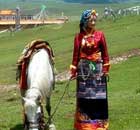Government and Policy
NPC starts reading amendment to electoral law
(Xinhua)
Updated: 2010-03-08 10:35
 |
Large Medium Small |
BEIJING: China's top legislature started Monday to discuss granting equal representation in people's congresses to rural and urban people.
A draft amendment to the Electoral Law, tabled at the ongoing annual full session of the National People's Congress (NPC) for third reading, aims to balance elections of lawmakers.
It requires "both rural and urban areas adopt the same ratio of deputies to the represented population in elections of people's congress deputies."
Lawmakers convened Monday morning their second plenary meeting of the 10-day session in the Great Hall of the People in downtown Beijing.
The Electoral Law was enacted in 1953 and completely revised in 1979. It then underwent four minor amendments.
Explaining the draft to lawmakers, Wang Zhaoguo, vice chairman of the NPC Standing Committee, said the law provides legal guarantees for elections of deputies to people's congresses, the country's fundamental political system, as well as citizens' right to vote and the right to stand for election.
After the last amendment in 1995, the law stipulated that each rural deputy represented a population four times that of an urban deputy. Critics said this could be interpreted as "farmers only enjoy a quarter of the suffrage of their urban counterparts."
Before the amendment in 1995, the difference was eight times. "Such stipulations were absolutely necessary and conformed with China's political system and the particular situation at that time," Wang said.
According to the 1953 national census, the urban population made up only about 13 percent. The rural population was much more than that of cities at that time and an equal ratio of rural and urban representation would have meant an excessive number of rural deputies.
With rapid urbanization and rural economic development, the proportion of urban population increased to 46.6 percent last year, he said, adding people's congresses at all levels have gone through many terms of elections, accumulating abundant experience.
"The time is right for equal representation," which is conducive to expand democracy, he said.
The amendment echoed Communist Party of China (CPC) Central Committee General Secretary Hu Jintao, who proposed in a report to the 17th CPC National Congress in October 2007 that rural and urban areas should have equal rights in election of lawmakers as "the people are masters of the country."
Wang said the amendment ensures "equal representation among people, regions and ethnic groups."
"Every administrative area, regardless of the size of its population, should have the same base number of deputies," and "ethnic groups with the smallest population must also have one deputy," he said.
The law did not specify the exact population that a lawmaker would represent. The top legislature would decide the specific ratio after passing the amendment.
The draft amendment also says "the number of grassroots deputies of farmers, workers and intellectuals should be guaranteed."
Currently, a large number of legislators in China are government officials and entrepreneurs, leaving few seats for farmers and workers.
It also added stipulations such as "organizing more face-to-face contact between candidates and electors to allow deputy candidates to introduce themselves and answer voters' questions."
On violations of statutory procedures in primary-level elections, the draft says "elections of lawmakers shall be subject to supervision."
It says the setup of polling stations, convening election congress and the management of mobile polling boxes should be further standardized and improved. It also suggests to set up "confidential polling booths."
Violence, threats, corruption and other acts that disrupts elections should be investigated and punished, the draft says.
Wang said the amendment did not include how rural migrant workers participate in direct elections in their work places as their "hukou" remained in rural hometown where they were registered as voters.
"The residence registration system reform is proceeding and the conditions are not yet in place to solve this issue," he said.
The number of deputies to the NPC is limited within 3,000, and the distribution of the NPC deputies is decided by the NPC Standing Committee, or the top legislature, according to the law.
The law says a name list of election candidates to a people's congress must be made public 20 days before the election and officially announced five days before the election.
Electors may vote for or against or abstain from voting, or vote for people other than the candidates. Candidates who stand for election as deputies to a people's congress can be deemed elected "if they receive more than half of the votes," it says.
It would take two or three readings before a law is passed by the top legislature. Lawmakers are expected to vote on the draft amendment at the closing meeting of the session scheduled on Sunday.







